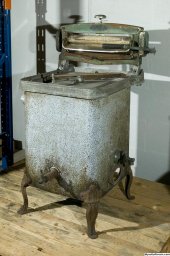If it's a top-loader with a single-speed induction motor and transmission in it probably needs a soft-start to manage LRA maybe a bigger run capacitor to keep reactive loading in check. An inductive AC motor in a washing machine would be a pretty savage load for a high frequency inverter to start up, regardless of inverter rated surge amps, due to their huge startup windings sized to do their job under load. That motor also stops and restarts several times throughout the cycle as the transmission switches between oscillation and high-speed spin, as well as evacuation pump engage/disengage. Start of the spin cycle, for example, would have both high-speed spin and evacuation pump engaged before starting the motor.
I think most front-loaders have variable speed DC motors, those would have almost no startup surge and put no positive reactive load on the inverter. Guessing it's not one of these since it's having issues.



